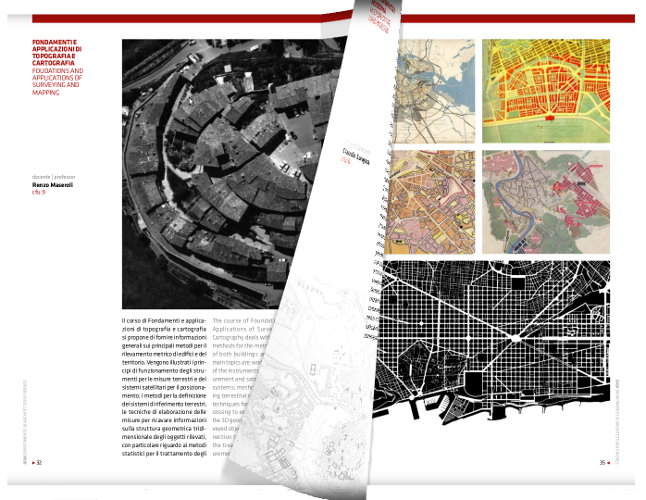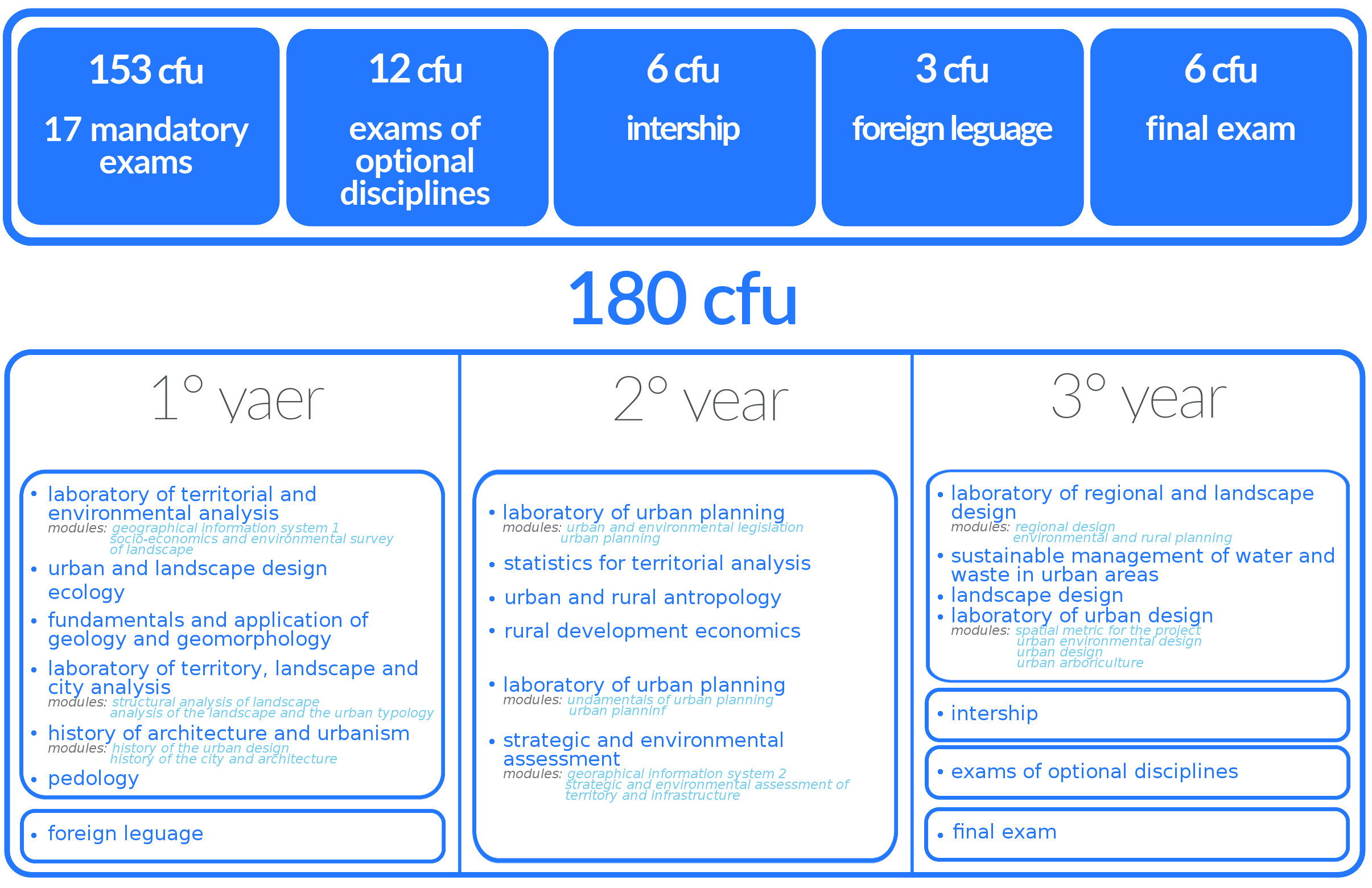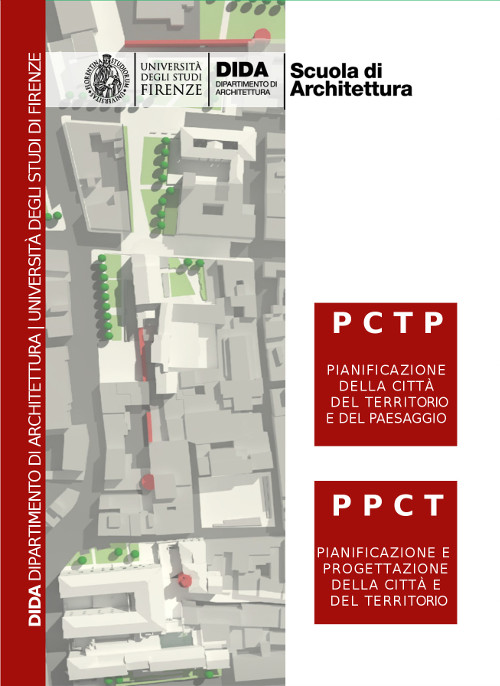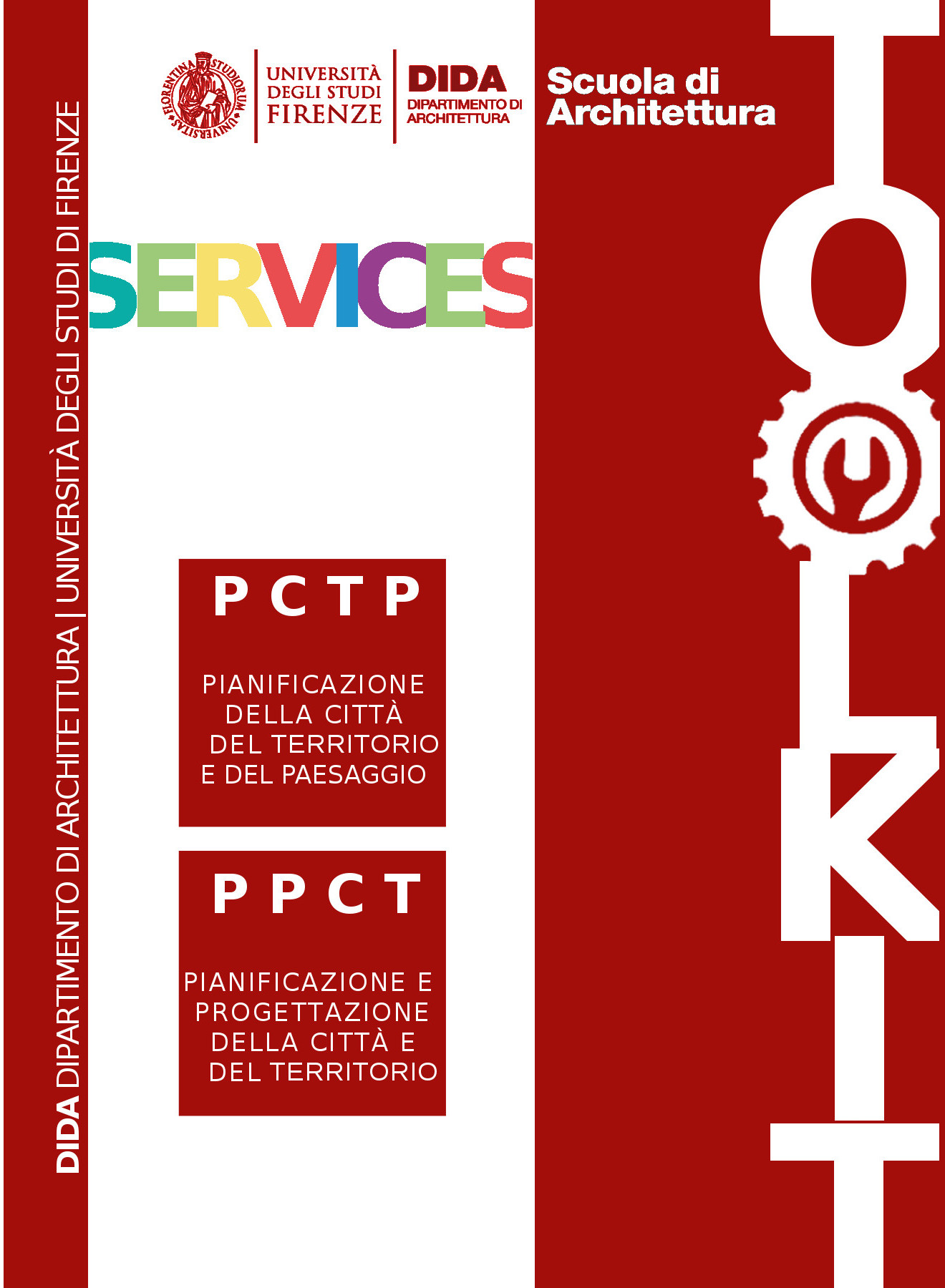Course Presentation
PRESENTATION
The degree course in Planning of the City, Territory and Landscape is aimed at young people interested in acquiring innovative knowledge for the study and planning of the city and the territory considered in all the richness of its meanings: settlements, environment and landscape. The purpose is to train a professional figure with the necessary skills for the realization of plans and projects for a sustainable use of the territory with the conservation of nature and the environment. The student, in his training, learns to read, interpret, analyze and design the city and the territory in their multiple aspects. Studying the territory means knowing deeply: the environmental and cultural heritage, the settlements and the cities, the landscape, the local society and the interaction it has with its environment. During the training course we study the natural resources, the cities, their transformations and the way in which man has designed the places where he lives, the identities of places, intimately linked to the social dynamics and vocations of local communities. The degree course is based in the city of Empoli.
FORMATIVE OBJECTIVES
The aim is to train technicians able to analyze and understand the settlements and territorial structures in interdisciplinary terms and to work on them through the conscious application of the planning tools with the degree of competence commensurate with the three-year degree.The objectives of the training course are pursued through laboratory experiences and basic and specialized monodisciplinary courses. Traineeships at local authorities and professional qualifications in the suitably selected sector and the degree thesis on project research topics complete the study program and the training course.
| Flyer Presentation | Flyer Toolkit |
| BOOKLET | |
 |
|
PROFESSIONAL PROFILES
The graduate in Urban, Regional and Landscape Planning, in accordance with the current regulations regulating the professions of the three year graduates (DPR 328/01), can carry out professional activities by carrying out analyzes of urban, territorial and environmental structures; Concorrere and collaborate with entes and professional studies to the elaboración of records of planning, programming, management and evaluation; To contribute to the definition of strategies of administrations, institutions and businesses with reference to the recovery, valorisation and transformation of cities, territory and the environment.The Degree in Planning the City of Landscape and Landscape allows access to the Master's Degrees in Planning and Design of the City and the Territory and Landscape Architecture (+ 2) and completing the professional skills.The occupational and professional outlets for graduates of the City Planning and Landscape Planning Course are the local government authorities (Regions, Provinces and Municipalities) and professional studios, centers and agencies providing services Analysis, planning and management of the territory and related services in all its aspects, with particular reference to the territorial information systems. After the State Examination, graduates in the field earned the title of "Junior Planner" and can enroll in the Professional List of Architects, Planners, Landscapists and Conservatives Section B and carry out their profession in the jurisdictions provided by law.The Degree in Planning the City of Landscape and Landscape allows access to the Master's Degrees in Planning and Design of the City and the Territory and Landscape Architecture (+ 2) in continuous training to acquire skills and career prospects of the most advanced type..
ENTRY REQUIREMENTS
To enroll in the course, a secondary education diploma or an equivalent qualification is required. Students wishing to enroll in the course must possess the following knowledge: - Computer elements: Data transmission and computer networks, archives and databases, operating systems, word processing programs, spreadsheets and storage environments, internet services. As required by the art. 6, paragraphs 1 and 2, of Ministerial Decree no. 270/04, the Study Program provides access tests to verify the adequacy of the student's personal preparation which, without hindering enrollment, make it possible to identify any educational debts to be recovered. Test to verify incoming knowledge
ARTICULATION OF THE COURSE
The course of study is divided into three semesters six years with the progression of studies from basic training (representation and drawing, statistics, pedology ...) to the characterizing one (urban and territorial analysis, ecology, economy, territorial information systems ,. ..) and the one most closely connected to the planning and design disciplines in the fields of study. Teaching is divided into single-subject courses, workshops and internships. The laboratories develop a theoretical and applicative teaching and are structured in such a way as to deal with problems appropriate to the course year and the progression of the training course. The internship carried out at local institutions and qualifying professional studies in the sector, appropriately selected, and the degree thesis on design research themes complete the training course aimed at continuing the studies or profession. The study plan also includes 12 credits chosen independently by the student. The degree course adheres to the student mobility programs recognized by the European Union University and other programs, at any level of the course of study. It is a condition for the recognition of credits sustained abroad that the student presents a project that reports the subjects attended, the programs of the same and the methods of verification of the acquired knowledge. They are recognized as study activities carried out abroad: - successful completion of proficiently documented exams, which may be completed with additional tests; - the educational activities related to the preparation of the final exam for enrollment in the course requires a secondary education diploma or an equivalent qualification. Students wishing to enroll in the course must possess the following knowledge: - Computer elements: Data transmission and computer networks, archives and databases, operating systems, word processing programs, spreadsheets and storage environments, internet services. As required by the art. 6, paragraphs 1 and 2, of DM270 / 04, the Study Program provides access tests to verify the adequacy of the student's personal preparation which, without hindering enrollment, allows the identification of any educational debts to be recovered. Proof of verification of the incoming knowledge the title taking advantage of the assistance of a foreign teacher as co-supervisor.
FREQUENCY AND PROPEDEUTICITY OBLIGATIONS
Attendance is mandatory in the teaching laboratories for at least 75% of the lessons. Although strongly recommended, attendance is free for disciplinary courses. The workshops and courses must complete the training activities and the related exercises by the end of the reference semester, preparing the conditions for the student to take the exam by the end of the semester itself. The revisions of the papers are guaranteed by the professors holding single-subject, integrated or laboratory courses until the end of the academic year in the forms established by them and previously communicated to the students. The educational workshops of the first year of the course are preparatory to the teaching laboratories of the second year of the course. The didactic laboratories of the second year of the course are preparatory to the didactic laboratories of the third year of the course. The educational workshops of the first semester are preparatory to the educational workshops of the second semester. The courses in Geology and geomorphology Foundations and applications, Elements of pedology, Fundamentals of general ecology, Representation of the city, territory and landscape, and Statistics for territorial analysis are preparatory to the Territorial and Landscape Design Laboratory. The frequency of any course (s) for the recovery of initial training obligations and the passing of any final test are preparatory to the Environmental Analysis Laboratory for the territory.
TYPE OF DIFFICULTY FORMS, EVEN DISTINGUISHING, EXAMINATION AND OTHER PROFIT VERIFICATION
Disciplinary Courses and Integrated Courses will be organized into lessons, exercises, seminars, guided tours, individual or group study assisted for the full acquisition of basic knowledge in disciplinary areas. The semester lab is the didactic method characterizing the design courses of the degree course. The lab allows for a more balanced teaching / student relationship, to develop more effective teaching and to encourage the regularity of the course. Laboratories will develop, in addition to lessons, exercises, seminars, guided tours, individual or group study, assisted design, growing planning difficulties and various intervention stages, while simultaneously addressing theoretical and operational aspects.
The conversion into credits takes place according to the following formula: 1 credit = 8 hours in classroomWhich includes at least 1 hour for exercises (both in courses and in laboratories, the verification of the profit is carried out through a final exam.) The ways in which the expected learning outcomes are verified consist of the evaluation of elaborate written, graphic, cartographic and individual computing / O group, aiming to detect the effectiveness of learning processes, carried out in a concerted and planned manner, profit-examinations aimed at assessing and quantifying with a vote the achievement of the overall objectives of the courses, which certify the degree of individual preparation Of the students and may take into account any formative evaluations carried out in the course.Further details regarding the type of study, the methods of verification, together with the criteria for admission to the following years, will be specified year by year in the Yearly Study Program of the Study Course. Specifically for each module, the document will specify the exact denomination in accordance with the scientific-disciplinary field indicated.
PROFITS EXAMPLES
Throughout the university course, the student's knowledge will be verified through written and oral exams.
FINAL TEST
To be admitted to the final exam, you must have obtained all the credits in the educational activities included in the study plan (180 credits less than those provided for the final exam). The final exam for obtaining the degree consists in a discussion, in front of a commission appointed by the course of study with the composition required by the University and School regulations in force, of a project theme agreed with a teacher of one of the disciplines of the course Graduation. 6 CFUs are awarded for this final exam.
Master Degree Course; Master; Specialization Schools; Perfection Classes; Professionale Update Courses.





